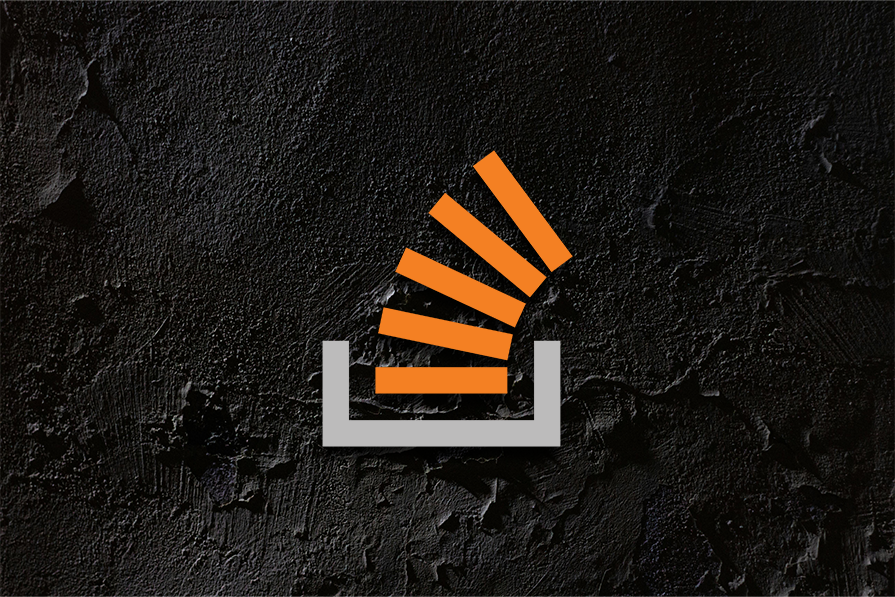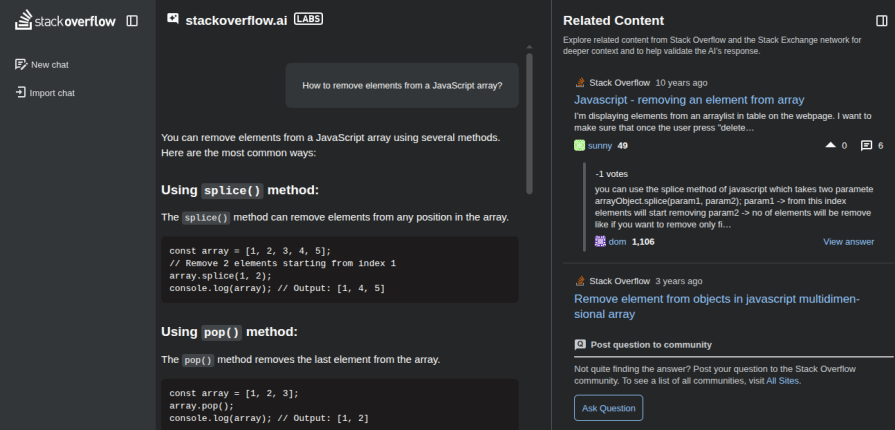What happens when dev communities die: Stack Overflow’s slow collapse
Programming is not a straightforward task — all developers face various problems regardless of what they are developing. Devs use online programming Q&A communities, also known as programming forums, to find solutions to their development issues. The most popular of these, Stack Overflow, has greatly contributed to the quality and delivery speed in the software market. It’s allowed programmers to find common solutions, advice, or ideas posted by experts, or to post new, unique questions to receive new, creative answers.
After ChatGPT’s launch at the end of 2022, the usage of Stack Overflow and other developer communities started declining. Generative AI tools could instantly display answers or apply solutions to most programming questions.
Now, Stack Overflow is slowly collapsing. Most developers started using generative AI tools installed in code editors as AI-powered peer programmers, instead of browsing traditional online forums.
Past developers used Stack Overflow, official documentation, studied complex codebases of dependencies, and did advanced experiments to find optimal solutions for software engineering problems. Now, most developers instantly solve most day-to-day programming issues by solely interacting with generative AI tools installed in code editors, redefining what we knew as programming!
What happens when every developer decides to use the new, fast, generative AI tools-based approach, abandoning Stack Overflow and the traditional human-centered, manual problem-solving approach? Can we maintain a sustainable foundation for the future of computer programming in this reality?
Let’s explore how Stack Overflow’s slow collapse affects programming and the possible realistic future for Stack Overflow vs. generative AI competition.
The golden era of Stack Overflow
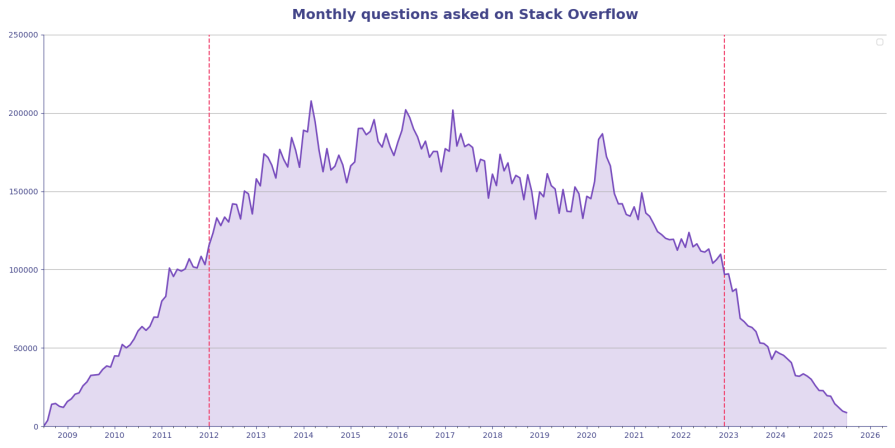
Jeff Atwood and Joel Spolsky launched Stack Overflow for the public in 2008 as a programming Q&A website. It only took a few years to become the most popular programming forum. Stack Overflow maintained its popularity among worldwide developer communities from 2012 to 2023, with a popularity peak in the 2014–2017 period, as depicted in the following graph:
From 2012–2023 , Stack Overflow went through its golden era, helping every developer speed up their work. Stack Overflow wasn’t yet another basic Q&A website with programming-focused information — it was a well-moderated, well-designed, high-quality, effective programming Q&A system that every developer used as the main online knowledge base for software development:
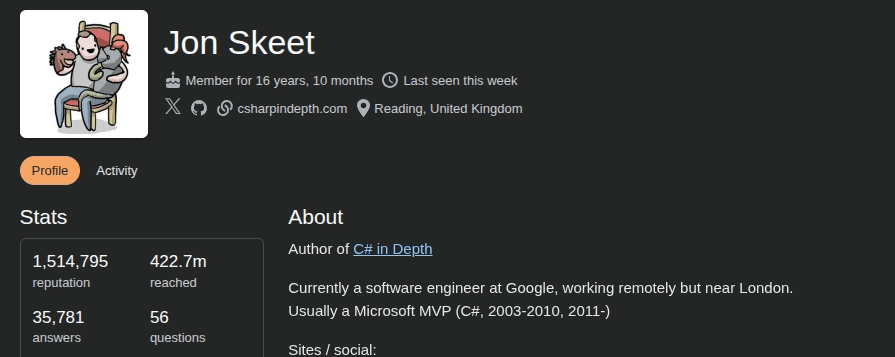
During Stack Overflow’s golden era, devs competitively contributed to the forum with high-quality answers and used the Stack Overflow profiles to show their skills, expertise, and community support:
It saved many developer hours in every company, from small companies to tech giants, and was the world’s #1 up-to-date Q&A knowledge base for programmers.
Rise of AI and Stack Overflow’s downfall
At the end of 2022, OpenAI released ChatGPT, which was trained with most public internet sources. According to many online discussions, this included Stack Overflow. Thus, ChatGPT was capable of accurately answering most common day-to-day programming questions and even some unique, advanced questions with its effective, intelligent core GPT (Generative Pre-trained Transformer) model:
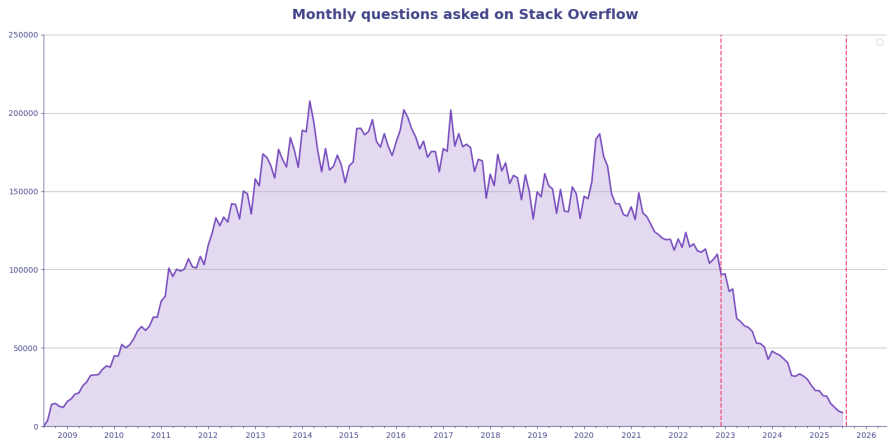
The following graph highlights how Stack Overflow usage started declining right after the public launch of ChatGPT:
Here is how developers decided to stay in the code editor using AI tools without browsing Stack Overflow to solve day-to-day programming issues:
- Initial explosion of available tools: After the release of ChatGPT, online AI chat systems, code generators, and debuggers showed the promising use of generative AI in programming, attracting programmers.
- Improvements to existing tools: More generative AIs were released, including Claude and GitHub Copilot. OpenAI improved ChatGPT with GPT v4 and v5, showing the promising future of AI-assisted programming for developers.
- Introduction of AI agents and chats: AI code editors were released, and all popular code editors and IDEs included AI chats to find solutions for programming issues and AI agents to apply quick code fixes, giving the virtual pair programming experience:
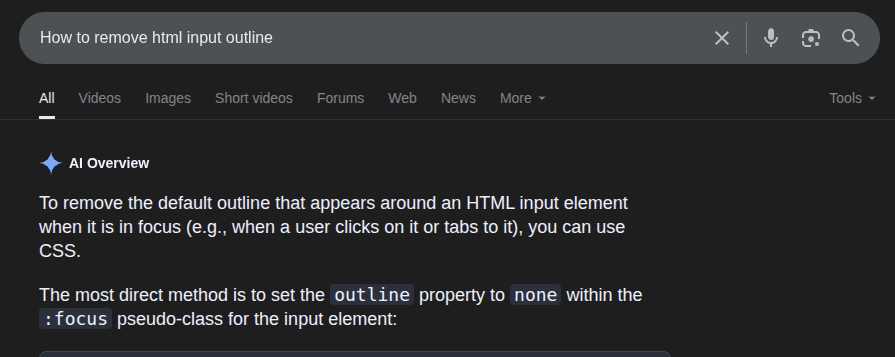
Now, most programmers use AI agents to instantly solve issues in code. Built-in AI chats in code editors allow devs to seek programming advice without manually browsing Stack Overflow or asking new questions. Developers who still use Google search will also get an AI-generated result before Stack Overflow results, affecting Stack Overflow’s search traffic and popularity:
Stack Overflow vs. generative AI
We went through Stack Overflow’s golden era and understood how the popularity of generative AI initiated Stack Overflow’s downfall. Let’s analyze the pros and cons of generative AI tools and Stack Overflow:
Speed
Stack Overflow depends on human-written answers, so if you ask a question, you’ll have to wait until someone posts an answer. This could take anywhere from a minute to days, months, or forever. You’re in luck if you face a common programming problem; then you may find your answer in existing Stack Overflow questions, and your productivity depends on your search tactics.
Generative AI auto-generates answers based on trained data using input keywords, so you don’t have to wait or write detailed, well-formatted questions — an instant answer is always guaranteed for a fair input query. Developers can ask AI agents to fix issues or improve code right from the code editor:
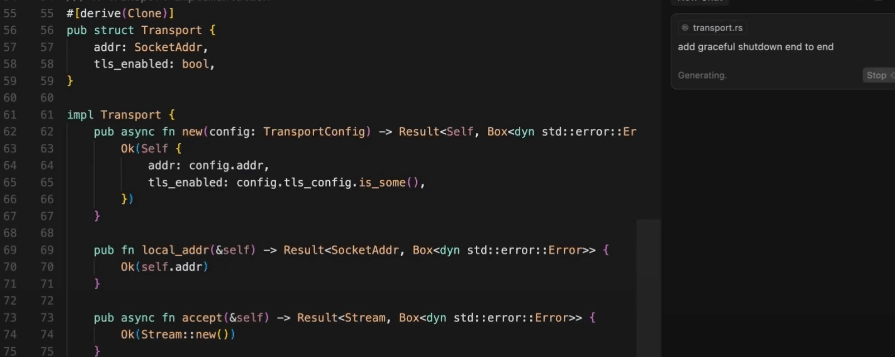
Verdict: Using generative AI is undoubtedly faster than using Stack Overflow.
Quality and accuracy
Moderators review and edit StackOverflow answers, and software engineering experts often post answers. The voting system and ranking algorithm in Stack Overflow put the best answers to the top and hide low-quality, unhelpful answers, so we can expect good quality and better accuracy in most questions:
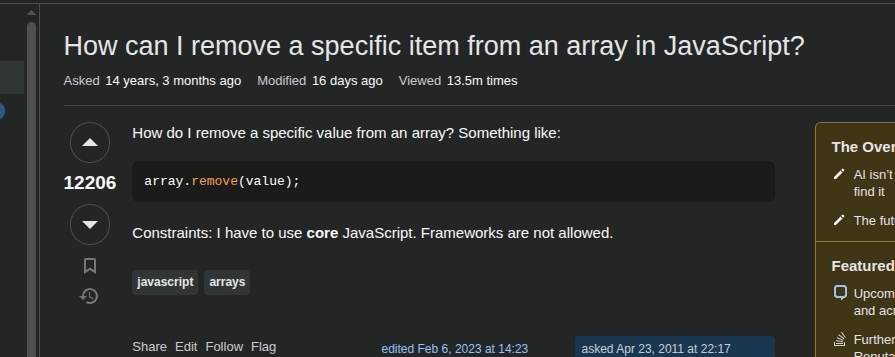
However, newly published questions can still get low-quality and inaccurate answers before moderator reviews.
Generative AI’s quality and accuracy depend on how common the question is. You’ll usually get a quality and accurate answer for some common questions, and low-quality, vague, and incorrect answers for unique questions. Besides, generative AI’s solutions are unverified by humans, so the probability of getting an incorrect solution is often high:
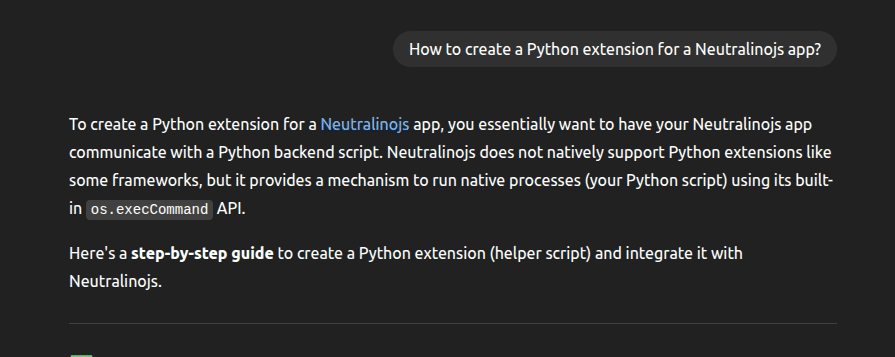
Verdict: Quality and accuracy can be guaranteed in Stack Overflow answers depending on the question’s maturity, but generative AIs’ quality and accuracy can never be guaranteed.
Interaction
Freelance developers, industry experts, software architects, academic experts, and experienced programmers post answers in Stack Overflow to gain reputation and achieve personal satisfaction by helping others. In Stack Overflow, we always interact with humans with different knowledge levels, skills, and experience, so the interaction is real and feels like talking to people in a physical workspace:
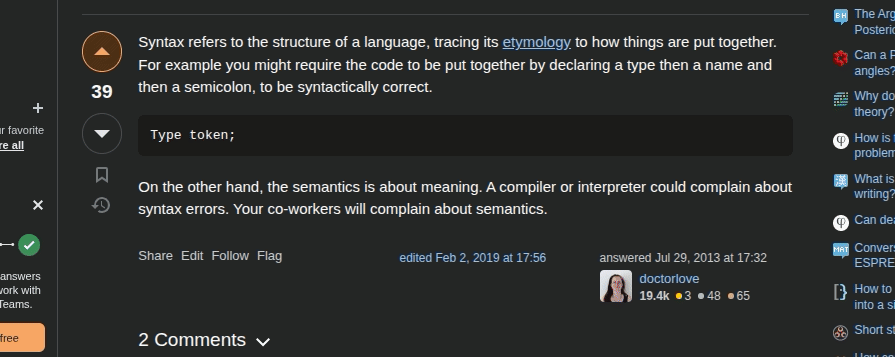
In generative AI tools, we interact with computer programs that generate answers based on pre-trained data, so the interaction feels inauthentic and often raises trust issues with the auto-generated answers.
Verdict: Stack Overflow offers better human-first interaction with human-written answers compared to generative AI auto-generated answers. However, generative AI motivates developers to build up progressive communication with the AI agent. This differs from Stack Overflow, where communication usually ends with an answer:

Intelligence and creativity
Experienced developers on Stack Overflow often post creative and intelligent solutions for complex problems. These answers contain personal experiments, research findings, and day-to-day working experience. On Stack Overflow, there’s a higher probability of getting a well-thought-out, practical answer for a unique question that hasn’t been published somewhere else.
AI never innovates or creates new ideas through experiments (as humans do) because of their strong dependence on training data sets . Generative AI’s intelligence is limited to the particular training data set, and creativity and logical skills don’t exist in AI. Thus, we can‘t expect creative and intelligent answers or ideas from generative AI tools.
Verdict: Stack Overflow undoubtedly wins over intelligence and creativity due to human-written, moderated solutions compared to generative AI’s auto-generated, unverified solutions:
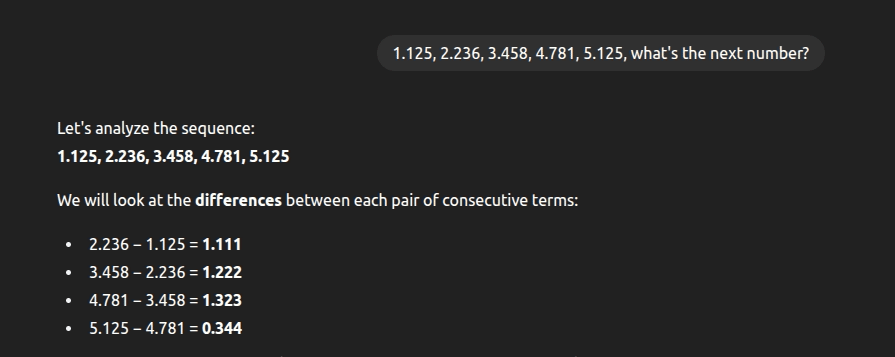
Common unsolvable issues in Stack Overflow
Stack Overflow wins over generative AI in quality, accuracy, interaction, intelligence, and creativity aspects, but it has some practically unsolvable issues:
- No instant answers: Stack Overflow runs the forum through a voluntary model — developers post and answer questions without a monetary reward. So, getting an answer takes time and depends on community availability.
- Not beginner-friendly: Stack Overflow discourages posting questions without personal research/experiments and often closes somewhat similar questions as duplicates. Beginners can search existing Stack Overflow answers as they wish, but they have to learn Stack Overflow rules before posting new questions.
- No follow-ups: Stack Overflow questions usually conclude with an answer, and there is no proper way to ask for follow-up questions and build up a progressive communication line with developers who posted answers. The Stack Overflow community recommends using comments only to ask for clarification and doesn’t recommend posting answers with comments.
These unsolvable issues become a major reason for modern developers to choose generative AI tools instead of using Stack Overflow.
Common unsolvable issues with generative AI
Regardless of the generative AI model or the type of AI tool (Q&A chatbot or AI assistant), all modern, popular generative AI systems have the following unsolvable issues with the current state of machine learning technology:
- Sustainability issues: AI cannot generate new concepts as humans without similar trained data. Generative AI systems should be trained with new human-written Q&A forum data and other online sources to let developers get up-to-date answers. Gen AI depends heavily on new human-written content, so a programming world with an independent AI-generated answering system is not sustainable.
- Unverified nature: Answers to programming questions are not reviewed and verified by humans in generative AI systems. Accuracy cannot be guaranteed with AI tools, since they always try to construct an answer regardless of the strength and quality of the actual trained facts
- Trust issues: People naturally tend to trust other people more than AI. Motivating developers to solely trust an AI-generated solution without human expert verification can be hard. That’s why experienced developers still prefer Stack Overflow and other traditional developer communities, while most beginners tend to use AI tools even for building complete products, also known as vibe coding.
The above issues in modern, popular AI tools mean that devs won’t fully quit Stack Overflow and all other similar programming Q&A forums, such as programming subreddits, Quora, Dev.to, Discord communities, etc.
What this means: The symbiotic relationship of AI and Q&A forums
Stack Overflow and other developer communities are collapsing due to the rise of AI tools, particularly those pre-installed in code editors. Moreover, developer communities also struggle with AI-generated answers while maintaining the quality of the platform content, e.g, StackOverflow banned AI-generated answers.
The modern developer generation started trusting AI than senior programmers do. Developer communities are dying, so what are the consequences?
When developer communities fade away, the developers will enter a solely AI-assisted programming approach. This is not sustainable and does not have enough strength to empower the software industry as Stack Overflow and other human-centered programming forums did.
AI now looks promising because these models are trained with up-to-date data. But when it doesn’t contain fresh sources, it’ll lose popularity because of outdated, inaccurate, verbose responses. Without proper oversight, everyone will return to dead, old-fashioned Q&A forums to fix the growth issues in the software industry.
Like Stack Overflow reached a popularity peak, AI tools will too. But they will lose popularity when generative AI models don’t have enough Q&A data from human-centered developer communities
All of that’s to say: if developer communities die, generative AI dies too!
So, is there a sustainable world for generative AI and developer communities to help the software industry grow better?
A possible future: generative AI with human-written content
Both human-centered programming Q&A platforms and generative AI systems have unsolvable issues, and choosing only one is problematic. For example, choosing only generative AI is not sustainable, and maintaining only traditional Q&A platforms is not productive or efficient enough for the state of modern software development.
So how do we build a future for generative AI and the traditional human-centered Q&A platforms? A future that is sustainable and also efficient?
The solution is to let generative AI and Q&A platforms coexist and let users choose which one to use based on the nature of the programming question. Quora already implemented this idea by integrating an AI assistant to generate summarized answers and also letting users ask follow-up questions:
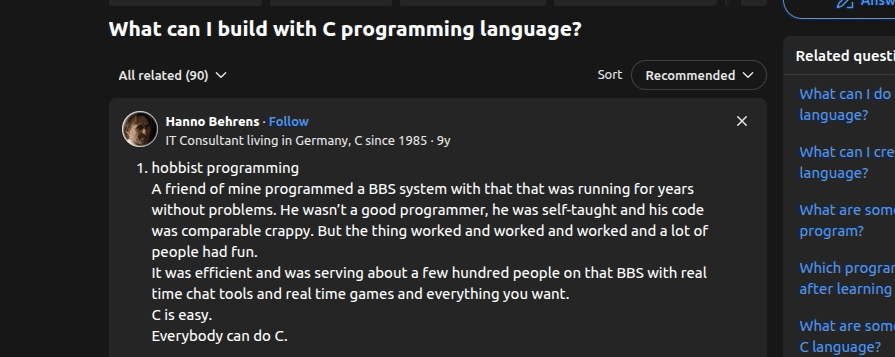
Integrating generative AI with human-written content is the only possible future that creates a living environment for developer communities and AI tools.
It works for a few reasons:
- A sustainable life cycle: It motivates developers to produce new human-written content and helps AI get trained with fresh content over time.
- User-preferred knowledge sources: Modern developers can still use AI to see answer summaries for quick overviews and read or request human-written original content for in-depth answers.
- Follow-up questions encouraged: Devs can ask follow-up questions with AI assistants, which may get up-to-date knowledge from other related questions and sources.
- Improved and verified generative AI answers: Q&A platforms can display instant AI-generated answers till human experts reply to particular questions, and adjust generated answers based on new human-written answers and developer feedback for AI-generated answers.
Stack Overflow hasn’t directly integrated generative AI yet with the platform like Quora, but the separate Stack Overflow AI website lets developers ask questions from a generative AI model and get instant answers:
We are still in an era where Stack Overflow and other developer communities are slowly collapsing. We’ll soon enter an era where both developer communities and generative AI happily coexist by building a sustainable knowledge-creation-feeding cycle, letting developers choose AI or human solutions based on their preference.
What to expect before AI and developer communities coexist
It will take time, perhaps years, to see the coexistence of both AI and developer communities. So what can we expect in between?
Until they coexist, StackOverflow and other developer communities will face a critical loss in knowledge gathering. Programming knowledge will stay only within official documentation/manuals, code repositories, and will be hidden at the core of generated AI models. In other words, we won’t see much activity in all programming Q&A platforms.
This information aggregation gap will affect the software industry as follows:
- Industry growth: Most developers practice AI-assisted vibe coding for debugging and won’t spend much time with experiments and innovations, as they did while using Q&A platforms. Vibe coding tools generate source code for developer requirements based on existing, popular libraries and design concepts, so the modern developer community won’t try new, innovative solutions that vibe coding AIs don’t know. This discourages innovators and affects overall software industry growth due to the lack of progress in developer ecosystems and theoretical programming.
- Codebase quality: AI solutions often generate verbose, unoptimized, long source code as solutions. Beginners will directly add them to codebases without proper review/refactoring and create low-quality codebases.
- Redefining programming: AI tools change the way developers do programming. Developing a generic software product will be like manufacturing a product in a factory — programmers do a few mouse clicks in a code editor, talking to an AI agent to solve issues, without building up optimal solutions using Q&A platforms and personal experiments.
Various parts of the software engineering industry will be affected, including onboarding, collaboration, training, design, development, deployment, and customer satisfaction.
For several years, AI will dominate, but will lose popularity when people realize the value of human knowledge creation.
Conclusion
Stack Overflow and other developer communities faced a significant traffic decline and are losing popularity because of AI tool innovations. Instant answers, code editor integration, follow-up communication, and beginner friendliness were major reasons behind the popularity of AI tools over traditional developer communities.
The popularity of AI tools is rising rapidly, but they will lose popularity when particular AI models fail to get up-to-date knowledge from human-written content in traditional Q&A platforms. So, the downfall of Stack Overflow and other developer communities is temporary — they will become popular again whenever generative AI models need fresh human-written content.
To get benefits from both AI tools and traditional Q&A platforms, the only possible way is to create a sustainable life cycle by letting AI models get fresh data from human-written content.
In such a future, AI tools will be alive forever and help developers with instant, accurate summaries. Active, popular Q&A websites will include in-depth, human-written, creative answers, and increase the lifetime of AI tools.
The post What happens when dev communities die: Stack Overflow’s slow collapse appeared first on LogRocket Blog.
This post first appeared on Read More


